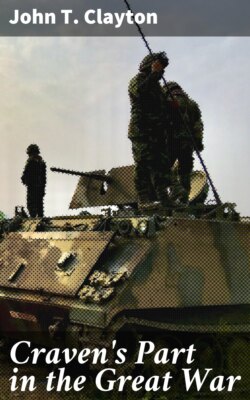Читать книгу Craven's Part in the Great War - John T. Clayton - Страница 22
На сайте Литреса книга снята с продажи.
THE GREAT GAS ATTACK.
ОглавлениеTable of Contents
On December 19th, in the darkness of the early winter’s morning, the Germans made another desperate attempt upon the line after discharging the deadly phosgene gas from cylinders. It was the strongest concentration of gas sent over by the enemy during the war: the ground over which the cloud passed was covered with powdered crystals like hoar frost, and Canadians on parade at Bailleul, twelve miles back, felt the effects. The 4th Duke of Wellington’s was in the front line, the 6th had B company and the machine gunners on the Canal Bank and the remainder in ruined farms a short distance behind. At 6–30 a.m. the battalion received orders to move forward through the clouds of gas to support the 4th. All reached their positions in perfect order and the men of the 4th were astonished at the speed with which the much-needed succour had reached them. The Germans, though they inflicted heavy losses on the 147th Brigade, reaped no tactical advantage from the outrage. The 6th had many casualties both from gas and shelling. The machine gunners, worn out by a particularly arduous time in the line, suffered very heavily, and among the eight who succumbed to gas was that excellent soldier Lance-Cpl. J. W. Willan, of Skipton, who had refused a commission elsewhere to serve in the ranks of the 6th.
The battalion, sadly reduced in numbers, had a last turn in the line and lost 2nd Lieut. T. Carson, mortally wounded on patrol, and Lieut. Malcolm Law, an admirable bombing officer, who was killed in the act of handing over to the incoming division.
Getting clear of the line by dawn on the last day of the year, the battalion, now little more than 200 strong, travelled by motor-bus to the neighbourhood of Herzeele and Wormhoudt for a month’s rest and reorganization. The Machine Gun Corps had recently been formed as a separate arm of the service, and the machine gunners under Sergts. J. Watson and F. Stork, who had both done sterling work for the battalion, were transferred to the brigade company under the new corps. At the beginning of February, 1916, the battalion moved by train to the neighbourhood of Amiens. It was a welcome change and the clean fields and green hills were a grateful sight to Craven eyes after the shellmarked flatness of the Salient. Though the Division was by no means up to strength it had temporarily to take over the line at Authuille, north of Albert, during a snowy spell at the end of the month. The share of the 6th Battalion was limited to two or three unpleasant days. Water up to the knees was no novelty, but the men have vivid recollections of some lively trench-mortaring, and of the droves of enormous rats that scampered over the snow at night like flocks of sheep.
